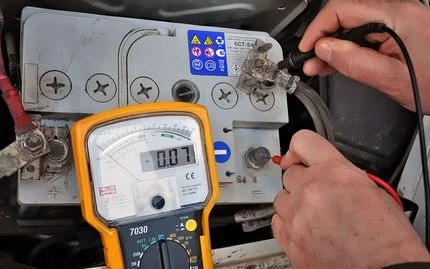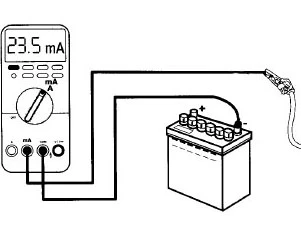Car battery drain calculator
Excessive drain current in a car leads to the battery discharge when standing. The causes and check of the drain should be considered separately. At the initial stage, it is important to understand the permissible drain and the value of milliamperes that are the norm for a particular car, since the losses depend on the number and name of the energy consumption sources. Using the formula — Battery Capacity (A) * number k, the online calculator will help you to calculate the permissible battery drain quickly.
The battery drain should be checked as often as possible, especially in wet weather!
What battery drain is normal

Permissible battery drain
Any car has a minimum battery drain of about 50-80 mA. This value depends on many factors. In particular, it depends on the wiring condition, the battery age and the purity of its terminals, as well as air temperature. Self-discharge of the battery in an open circuit is allowed by no more than 1% per day. But given that it is constantly connected to the vehicle network, this value can reach up to 4 percent. Thus, the permissible battery drain is equal to the capacity multiplied by a factor of 0.4.
Since besides the permissible car battery drain, current consumers such as alarm system and immobilizer (20-25 mA), audio system (3 mA), central lock unit and ECU controller (5 mA) can consume current even at solid state, static current is much higher. Total standard battery drain is considered to be 50-70 mA, and the maximum permissible value is 80-90 mA.
Increased current may occur due to: old damaged wiring (in most cases), short circuit through oxides, damaged wire insulation and improperly connected alarm system or car stereo. Although a moderate current consumption by the alarm system is allowable, since it is an active device and requires power supply of the radio unit, volume/impact sensors and light emitting diode.
Our online calculator helps you to calculate the current drain depending on the self-discharge of the battery (for a new battery loss rate is 0.5–1.0% and for a used battery it is 1–1.7%) and the number of consumers that consume power even at solid state.
How to use the car battery drain calculator
To calculate the permissible battery drain, it is necessary to:
- Check what standard consumers you have. Note that improvements of multimedia and audio systems, as well as systems of autonomous engine control are not taken into account, since there is no single value for current consumption.
- Specify the capacity of the installed battery.
- Choose the relative age of the battery (self-discharge depends on it, since in addition to the provoked and operational discharge, there is also the electrolytic and natural discharge).
- Click the “Calculate” button and you will get the result of the permissible static current in the “Permissible battery drain” field.

After the ignition is switched off, the current consumption should either stop at all or be minimal, and its value can be ignored. Modern business class cars can be unused from autumn to spring and start with half a turn of the key. The same cannot be said for other low-cost cars. On the contrary, they suffer from excessive static current. It is able to discharge the battery not only for a month, but for a week (sometimes even for a day).
Permissible battery drain
When you have calculated the consumption at solid state, you can determine the permissible values of the battery drain according to the table, which specifies at what level of losses you can start the car.
| Consumer current drain (mА) | The time after which a car cannot start |
|---|---|
| ≤20-30 | The car can stand in the parking lot for a couple of weeks and then start without any problems. |
| 50-80 | The value is rather big, if there is a standard alarm system, but it is acceptable, if there is a developed non-standard audio system. A car with an old battery cannot be started in 3-4 days. |
| ≥100> | It is a sign of electrical failure or installation of low-quality gadgets. In winter, it will be enough not to start the car for 1-2 days, and you will have to jump-start the car. |
If you know the value of the car battery drain, you can calculate how long the battery operates (discharge time) provided that the car is at solid state for a long time.
FAQ
-
What is the normal leakage current in a car?
There is current leakage in almost every car, and the norm will depend on the amount of additionally installed electronics, which can consume energy even in standby mode, as well as the peculiarities of the on-board power supply. Therefore, 0.05 amps is the norm for a modern car. And in some cases even 70 mA is also acceptable.
-
What is the leakage current through the alarm system?
In working mode, the security device consumes up to 200 mA of current depending on its complexity, the number of sensors and method of connection. Leakage current through the alarm system — 20-30 mA is normal, the main thing is that to this figure consumption decreased after 5-10 minutes after it was turned on. Its problem places are considered to be the limit switches of the hood and trunk doors, as well as the communication module (oxides appear on the board).
-
What is the leakage current through the radio?
The leakage current doesn't exceed 0.01A in a car with a properly connected 1 din stereo, or 0.02A if you have a 2 din. The main problem is in the connection of the power wire (red) and the wire responsible for saving the settings (yellow in one twist) and directly to the battery. Only the yellow wire «memory» should receive constant power. Also the leakage current through the radio, as in the case with the alarm system, when the ignition is completely turned off, should decrease after 10 minutes of rest.
-
How to measure the leakage current?
You can measure the leakage current with a multimeter or a clamp meter (allows you to measure the leakage current without contact) by putting the car alarm system into guard and waiting for 10-15 minutes since there are ECU that go to sleep mode not at once.
To measure the leakage current multimeter is necessary to connect consistently in the chain of power on-board network, before the minus terminal on the battery. First, you need to set the tester on the switched on 10A DC measurement mode. Then, having removed the «minus» terminal from the negative terminal on the battery, connect one of its probes to the minus terminal of the car, and the second (red) probe to the minus terminal of the battery. The leakage current will be displayed on the dial.
When measuring the leakage current with clamps on the device you need to set the measurement of DC current, and the measured conductor, can be as the whole twist going to the minus terminal of the battery, and from individual consumers, is placed in the ring of pliers previously turned off the ignition completely. On the display you can immediately see the current consumption of the car electronics at rest.